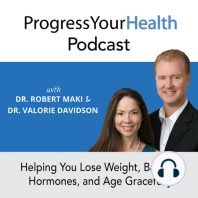1 min listen

What Does Endometriosis Feel Like? | PYHP 042
What Does Endometriosis Feel Like? | PYHP 042
ratings:
Released:
Jun 4, 2018
Format:
Podcast episode
Description
Endometriosis is a condition that affects many women. It is estimated that about 10% of females ages 15 to 49 are affected. I think this percentage of women with endometriosis is much higher than 10%. That is because the only sure way to be diagnosed with endometriosis is to have laparoscopic surgery.
There are many signs and symptoms of endometriosis, but they tend to overlap with other hormonal imbalances. Often it is confused with fibroids, ovarian cysts, and painful, heavy periods to name a few. And like I said, the only sure way to know is having surgery and finding endometriosis in the pelvic cavity.
What is Endometriosis?
Endometriosis is the lining of the uterus has seeded itself elsewhere in the body. The top lining of the uterus is called the endometrium. It is the cells of this lining (endometrium) that is found outside of the uterus. Common places endometriosis is found:
-Fallopian tubes: Sometimes it can cause scar tissue on the fallopian tubes reducing fertility or can contribute to an ectopic pregnancy (which is a health emergency).
Ovaries: commonly it can cause ovarian endometrioid cysts.
Colon
Cervix
Vagina
Bladder
Some rare reports have shown in the lung cavities and other organs
Why is there Uterine Tissue Not in the Uterus?
There are many conflicting theories on why the endometrium lining that is supposed to be in the uterus is elsewhere in the pelvic cavity. A long-held theory is in utero when cells are developing; uterine cells are seeded in other areas outside of the uterus. A more recent theory is there is a retrograde of flow during a period. The blood backs up and out of the uterus causing uterine cells to plant themselves anywhere in the pelvic cavity.
New hypotheses are endometriosis is an extension of autoimmune and inflammatory diseases. But plenty of people do not have endometriosis. Why some do and not others? Like mentioned above it could be genetic, autoimmune, lifestyle, retrograde mechanical flow, etc.
The old-school theory of developing in utero has pretty much been put on the shelf. Endometriosis often comes back after laparoscopic surgery. Sometimes it comes back slightly, moderately or its back with a vengeance after surgery. Which is why many women with endometriosis have had more than one surgery.
The big question: What Does Endometriosis Feel Like?
Pain: Pain is the number symptom that women with endometriosis are seeking answers. There are several types of pain that are experienced in endometriosis. And the pain is no reflection of how much endometriosis they have in their pelvic cavity. Some women have minimal endometrial lining seeded outside of the uterus. But report debilitating pain. Other women have stage fo
There are many signs and symptoms of endometriosis, but they tend to overlap with other hormonal imbalances. Often it is confused with fibroids, ovarian cysts, and painful, heavy periods to name a few. And like I said, the only sure way to know is having surgery and finding endometriosis in the pelvic cavity.
What is Endometriosis?
Endometriosis is the lining of the uterus has seeded itself elsewhere in the body. The top lining of the uterus is called the endometrium. It is the cells of this lining (endometrium) that is found outside of the uterus. Common places endometriosis is found:
-Fallopian tubes: Sometimes it can cause scar tissue on the fallopian tubes reducing fertility or can contribute to an ectopic pregnancy (which is a health emergency).
Ovaries: commonly it can cause ovarian endometrioid cysts.
Colon
Cervix
Vagina
Bladder
Some rare reports have shown in the lung cavities and other organs
Why is there Uterine Tissue Not in the Uterus?
There are many conflicting theories on why the endometrium lining that is supposed to be in the uterus is elsewhere in the pelvic cavity. A long-held theory is in utero when cells are developing; uterine cells are seeded in other areas outside of the uterus. A more recent theory is there is a retrograde of flow during a period. The blood backs up and out of the uterus causing uterine cells to plant themselves anywhere in the pelvic cavity.
New hypotheses are endometriosis is an extension of autoimmune and inflammatory diseases. But plenty of people do not have endometriosis. Why some do and not others? Like mentioned above it could be genetic, autoimmune, lifestyle, retrograde mechanical flow, etc.
The old-school theory of developing in utero has pretty much been put on the shelf. Endometriosis often comes back after laparoscopic surgery. Sometimes it comes back slightly, moderately or its back with a vengeance after surgery. Which is why many women with endometriosis have had more than one surgery.
The big question: What Does Endometriosis Feel Like?
Pain: Pain is the number symptom that women with endometriosis are seeking answers. There are several types of pain that are experienced in endometriosis. And the pain is no reflection of how much endometriosis they have in their pelvic cavity. Some women have minimal endometrial lining seeded outside of the uterus. But report debilitating pain. Other women have stage fo
Released:
Jun 4, 2018
Format:
Podcast episode
Titles in the series (100)
What is Intermittent Fasting? | PYHP 06: Up until fairly recently, a popular dietary approach for weight loss was to consume several small frequent meals throughout the day. The rationale behind this strategy is that eating every 2-3 hours would increase metabolism and the pounds would drop of by Progress Your Health Podcast